Wednesday Feb 18, 2026
Wednesday Feb 18, 2026
Thursday, 2 May 2024 01:29 - - {{hitsCtrl.values.hits}}
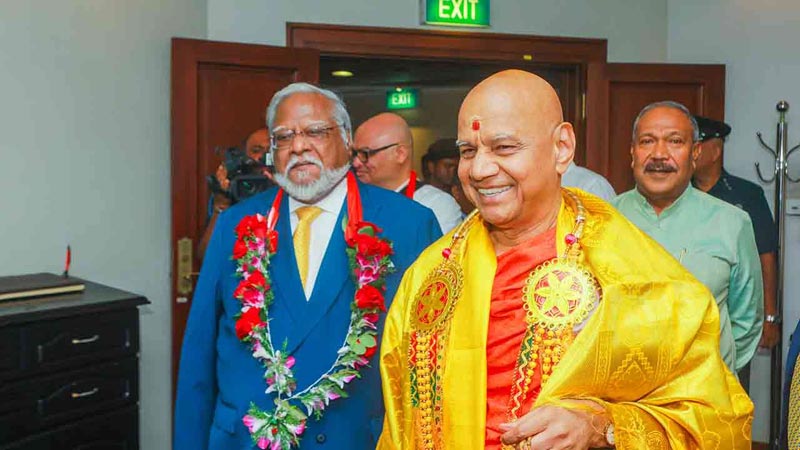
Swami Govind Dev Giri Maharaj
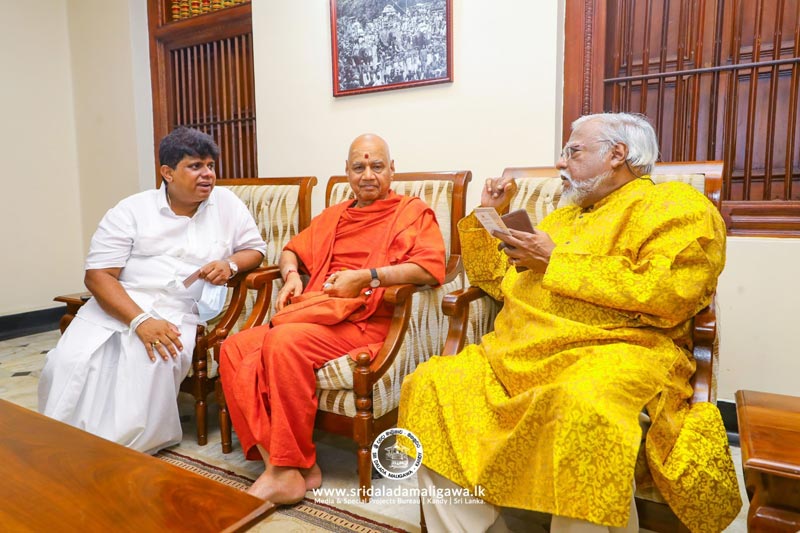
The urge to Nirje
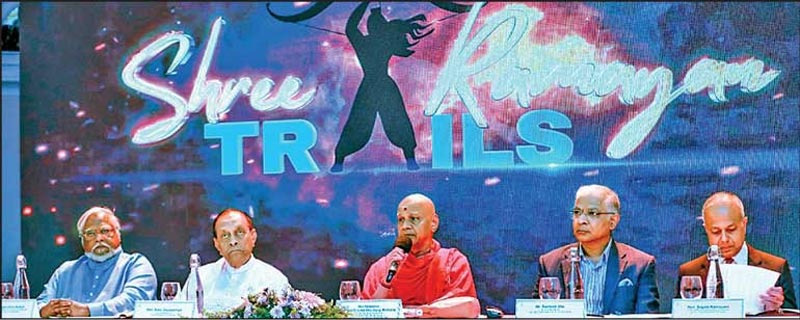
Ramayana Tale & Trails
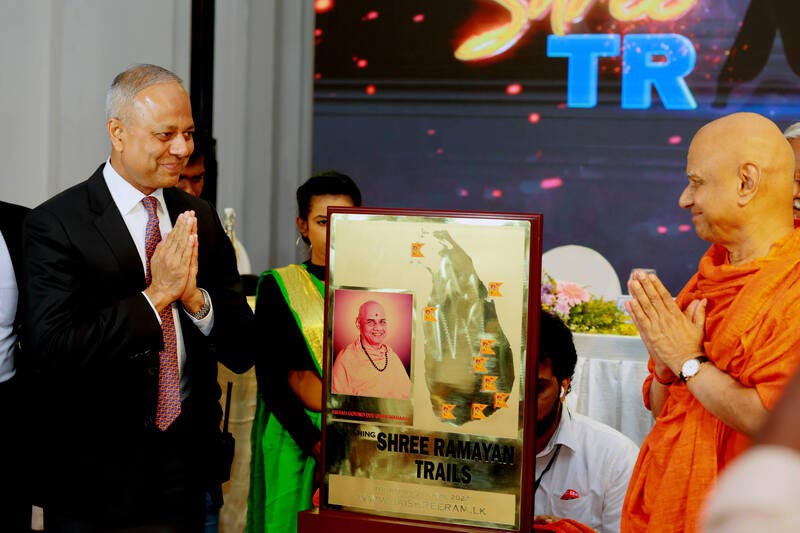
“Not two countries” says Swami
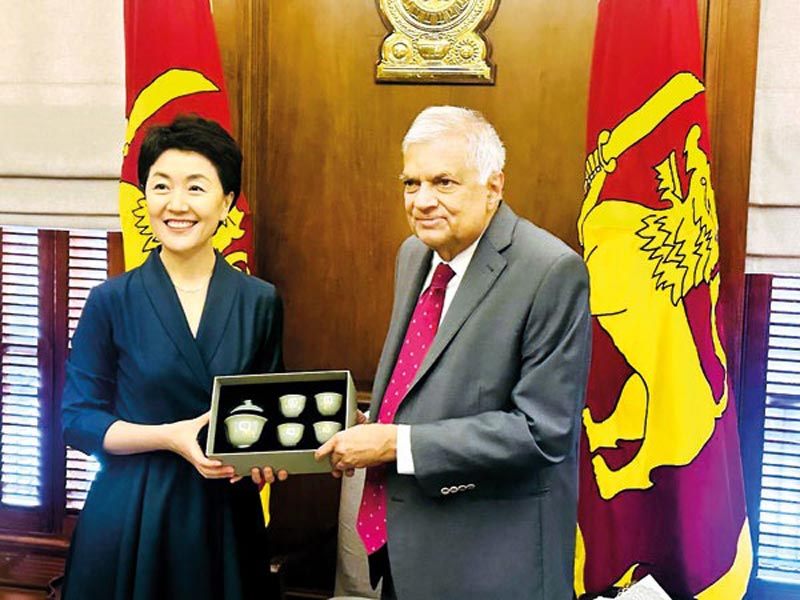
China counterweight
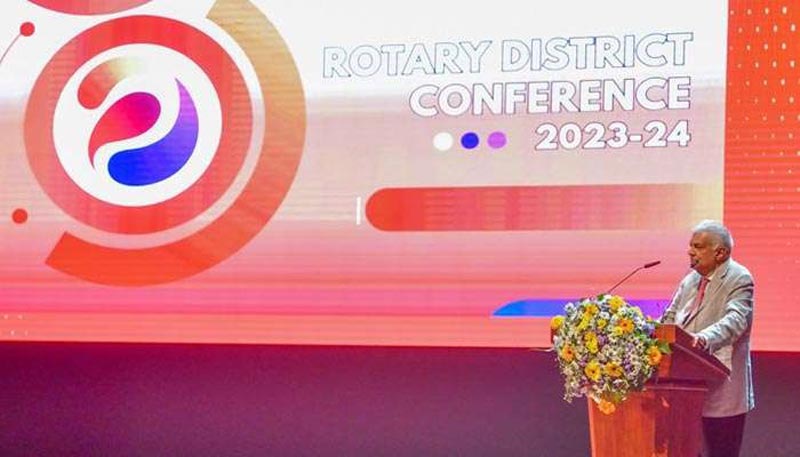
No plan, only market forces
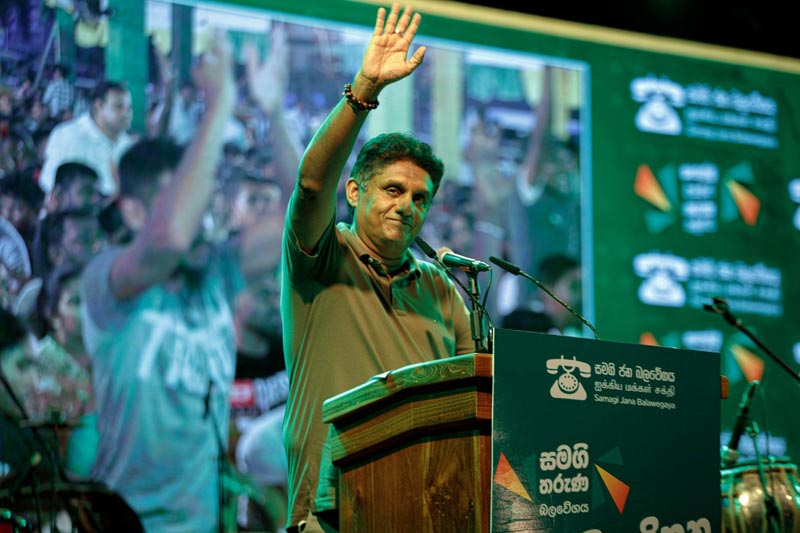
Strong contender, bad company
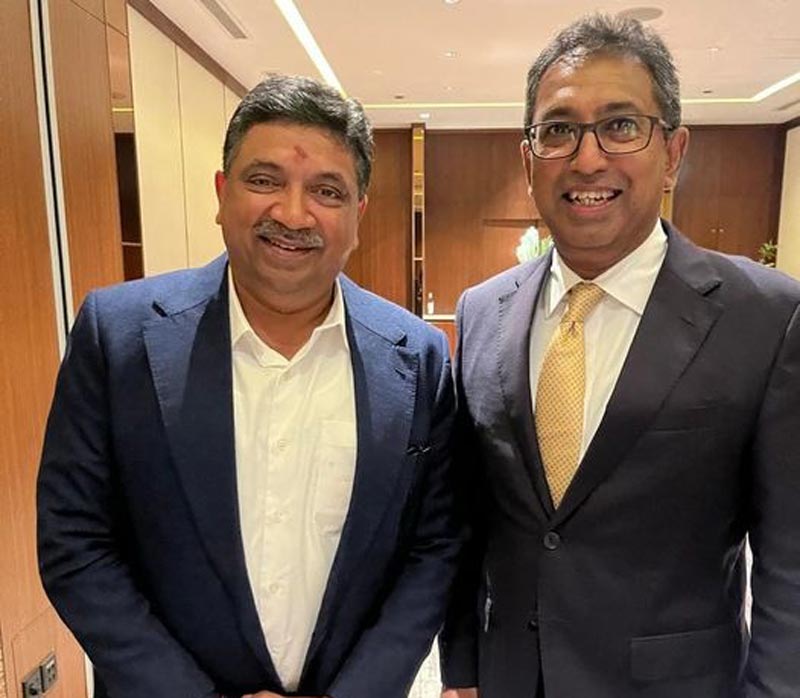
“Unite with Tamil Nadu”
“Thus, the easiest method we have would be for us to unite with Tamil Nadu state.”
(“Apata thiyana pahasuma kramaya thamai, Thamil Naadu praanthaya samaga apata ekvenna.”)
– Dr. Harsha de Silva,
SJB shadow Finance Minister,
SJB Youth Convention,
Kegalle, April 27th 2024
(https://youtu.be/ozH7BUs3ACw?si=TffdAX3oKdj9BuPd, at 12:53)
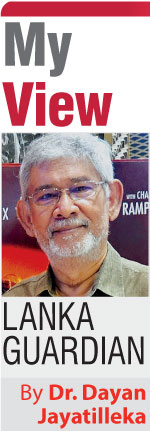 With exactly the same figures of indebtedness, we could still have been facing this crisis in far better shape than we are now.
With exactly the same figures of indebtedness, we could still have been facing this crisis in far better shape than we are now.
Even those who didn’t derive it from Prof Joseph Nye’s theory of ‘soft power’, would know from the final episode of Game of Thrones, the importance of ‘stories’; of narratives and their power to persuade, or the absence of such persuasive power.
In 2022 Sri Lanka was seen throughout much of the world as a heroic island in which there was a mostly peaceful people’s uprising, even a democratic people’s revolution, which ousted an elected ex-military autocrat. The word ‘Aragalaya’ was globalised by the international media. The demonstrations by Sri Lankans the world over, from Liverpool to Latvia, and especially the same-day demonstrations in the 50 states of the USA, gave us the kind of soft power that few countries had.
Moral capital
We could have gone into the debt negotiations including with the bondholders on a far better footing, if we had retained that fund of soft power, or in the category minted by Prof John Kane (my doctoral supervisor), “moral capital”—because none of those we are indebted to are impervious to public opinion in their societies.
There was only one way we could have done this, and that is, if the successor administration to Gotabaya that we had chosen, had either arisen organically from the Aragalaya or was sympathetic to it. In short it had to have been an administration on a continuum with the Aragalaya, which could therefore draw on the ‘moral capital’ it had accumulated in global society.
This might have happened had we gone for elections. Instead, the Parliament chose the successor.
The majority in Parliament had earlier supported Gotabaya. They had a chance to make an enlightened choice. They could have picked a respected dissident from their own ranks, Dullas Alahapperuma, who had stepped forward as a candidate, having obtained the support of the Opposition. Had the ruling SLPP, led by the Rajapaksa family opted for their former ideologue Dullas, the country’s profile would have been of a post-Aragalaya island, led by a progressive democrat who had conspicuously been exempted as a target by the Aragalaya. This would have been a perfect profile for debt negotiations because Sri Lanka would have retained a fund of goodwill and sympathy; even applause.
But the SLPP chose Ranil Wickremesinghe, a man unelected to Parliament, embittered at the Aragalaya because it allegedly tried to force him to resign so the country could hold an election; a man who violently cracked-down at 3 AM on the residue of the Aragalaya encampment which had already been dismantled and evacuated for the most part; a man who is using the debt restructuring to implement his extremist economic agenda of liquidating the public sector, for which he had never obtained a mandate. Indeed, his neoliberal economic agenda was a reason he never won a presidential election.
SJB flip
The second shift resulting in the present moment was the ideological abdication by the main parliamentary Opposition the SJB, in no way an anti-Aragalaya party and whose leading woman personality Hirunika Premachandra played a catalytic role in the revolt.
The SJB’s abdication lay in being supportive or uncritical of Ranil’s economic (austerity) program. Having lost Presidential election 2019 partly by having Ranil Wickremesinghe on his platform, Sajith Premadasa now goes into Presidential election 2024 having Ranil’s economic policies and policy proteges (the SJB’s Economic Council) on his platform.
Who flipped the party led by the son of President Premadasa, patriot, populist-developmentalist and economic social democrat?
Swerving from his predecessors’ pragmatism since 1946, in 1997 Ranil Wickremesinghe inserted the UNP into the matrix of the global Right, the International Democratic Union (IDU), led by the US Republicans and the UK Conservatives. Sajith never delinked the SJB and relinked it with the US Democrats, UK Labour and international Social Democracy. He kept it plugged into the feed.
After President George HW Bush, the US Republican party shifted to the far Right; hence George Bush Jr. and more so, Donald Trump.
The US Republicans have more influence on the SJB ideological ‘line’ than the Communist Party of China or Cuba has on the JVP ‘line’. The US Republican party assists and influences both the UNP and SJB through the International Democratic Union (IDU) as well as the programs of ideological education run by the International Republican Institute (IRI) office in Sri Lanka.
Story power: Ramayana rules
As stories go, even more powerful than the legend is the myth. If someone tries to push their story on you and that story has you or your country or your ancestors, however mythical, in it, you must exercise caution. Never allow someone else’s version about your country and your story, to get past you without critical scrutiny.
If someone tries to push a line about your country and its legendary or mythical past on you, then there’s something hegemonistic about him/her. But if you let it go without reaction or comment, there’s something servile about you.
What is worst is when an outsider has a story which villainises your country’s mythical hero and has the ill-grace to shove that version in your face, in your town, and you say nothing about it; you actually cheer. The disgrace is on you, on us. That’s exactly what happened here last week.
Sri Lanka had a colourful and loquacious visitor from India/Bharat, Swami Govind Dev Giri Maharaj. The head priest of the Sri Ram Pooja Mandir in Ayodhya, now a mega-temple, a citadel almost, and the headquarters of Hindutva, he is Treasurer of the Shri Ram Janmabhoomi Teerth Kshetra Trust. Strangely for a spiritual figure, the Swami was accompanied on his Lanka visit by a group of Indian investors.
With Ranil’s chief-of-staff and National Security Advisor Sagala Ratnayake as chief guest and Karu Jayasuriya as keynote speaker, he launched the ‘Sri Ramayana Trails’. The project intends to network and enhance nine nodal sites across Sri Lanka supposedly epitomising the Ramayana. Inexplicably, (Kasyapa’s) Sigiriya is listed on the Ramayana trail.
The Ramayana openly villainises Ravana and exalts Rama, unlike Homer’s Iliad which states its intention to recognise the valor of both the Greeks and the Trojans and be even-handed—which it does by the pathos in its treatment of Troy’s hero Hector and its critique of Greece’s greatest hero Achilles because of his brutality towards Hector’s corpse, which outraged the Gods and caused Achilles’ downfall. This is what makes the Iliad, which antedates the Ramayana, a more universalist and unsurpassably superior work of world literature.
While in Lanka, the visiting Swami repeated the villanisation of Ravana, and exalted the Lankan traitor and collaborator Vibhishana, Ravana’s younger brother. He went on to make an assertion that was only episodically true even in myth when Hanuman and his monkey army constructed a bridge by placing huge rocks in the Palk Strait.
The Swami assured us that “Sri Lanka and India are not two countries”, “we are one civilisation” and “they say Lanka was Ravan’s, but I say Lanka is not Ravan’s, Lanka is Vibhishana’s”.
This stuff is to be taken very seriously, because we hear from no less exalted a state and intellectual authority than Minister of External Affairs, Dr Jaishankar, that the Ramayana is key text and template of Modi’s Bharat and its “nationalist foreign policy”. A ‘nationalist foreign policy’ is one thing, but a nationalist foreign policy based on myth and religious cosmology is something else, especially for the neighbourhood and most especially when it is the policy of the regional power. Witness Israel.
The ‘Ramayanistas’ who insist that we are one civilisation and therefore are not two countries fail to understand that such ideology can only rekindle Sinhala nationalism. The sole component on the island that has no counterpart in Indian civilisation and doesn’t overlap with it; the only factor that is most distinctively Lankan in the sense of unique to the island, is the indissoluble ensemble of Sinhala language and Sinhala community, which enjoys considerable demographic preponderance on the island.
Because of their civilisational uniqueness to the island, unshared with India, the Sinhalese thus emerge or are revealed as the backbone of the island’s sovereignty, and Sinhala nationalism as the bedrock --in the final analysis-- of Sri Lankan nationalism.
The Ramayanist ‘civilisational expansionist’ claim also shapes the island’s Buddhism, making for a less universalist and more particularist (ethnic) emphasis as a functional, protective (self-defensive) armour: Sinhala Buddhist.
Chanakya and China
When I hear Swami Govind Dev Giri Maharaj, prominent ideologue of the Ramayana from a neighbouring country, tell me that “we are not two countries”, I reach for my copy of Kautilya’s The Arthashasthra. Kautilya, also known as Chanakya, the advisor of the Mauryas, tells us that due to inescapable, purely geopolitical logic, the main threat to a state comes from its neighbour.
Meanwhile, the SJB’s shadow Finance Minister, Dr. Harsha de Silva actually advocates that we “unite with Tamil Nadu”. (https://youtu.be/ozH7BUs3ACw?si=TffdAX3oKdj9BuPd, at 12:53)
Harsha’s view is perfectly congruent with Ranil’s (neo-Hanuman) project of a bridge to Tamil Nadu. It also dovetails with Kanchana’s ongoing plan to connect Sri Lanka’s electricity grid to India’s. The multi-party Right has adopted the Swami Govind-Harin Fernando doctrine that India and Sri Lanka “aren’t two countries”.
The geopolitical and geostrategic implications are transparently horrendous. An administration with a finance minister who worked towards “uniting Sri Lanka with Tamil Nadu” is an awful prospect.
Kautilya’s Arthashasthra concludes logically that a state’s best ally is not its neighbour but rather its neighbour’s neighbour.
Therefore, it was refreshing to see Sun Haiyan, a Deputy Minister from the International Relations Department of the Communist Party of China, drop by. It was also good to have the Iranian President declare open the Uma Oya project.
I may not be quite so glad if I were a citizen of a country which has territorial issues with China or vice versa, but I am not an immediate neighbour of China. Chinese fishing boats don’t invade my waters, pillage my fishing grounds and damage my sea-bed. Chinese ideologues don’t claim that I am not a separate country from their own. Visiting Chinese personalities with official diplomatic patronage don’t celebrate a myth which hails the invasion of my island, villainises my (mythical) leaders and heroises my (mythical) traitors.
I don’t have a President who wants to build a bridge that connects my island with China. But I do have an unelected President who wants to build a bridge to Tamil Nadu.
China exists as a counter-pole in the world economy and the world-system. In the pincer we are in caught between the powerful private bond-holder cartel and Indian economic-cultural expansionism, we shall have to rebalance by a partial pivot (back) to China.
We the citizens must elect someone who can maintain cordial, non-confrontational relations with India while being the least likely to play the Vibhishana role. We must elect a President who can perform the same role in relation to India that the President of Vietnam plays adroitly in relation to China.
Economic triangulation
President Wickremesinghe must be commended for publicly summing-up his economic philosophy, one which the SJB affirms it has no strategic-doctrinal differences with.
 “…Allow me to recount an incident today when a young person asked me, “What plans do you have for the country? What plans do you have for the educated people? What plans do you have to develop the physical infrastructure?” To which I replied, “I have no fixed plans.” I can only envision a market economy where market forces will determine the course…”
“…Allow me to recount an incident today when a young person asked me, “What plans do you have for the country? What plans do you have for the educated people? What plans do you have to develop the physical infrastructure?” To which I replied, “I have no fixed plans.” I can only envision a market economy where market forces will determine the course…”
(https://www.ft.lk/front-page/President-expresses-confidence-in-biz-community-to-drive-economic-growth/44-761162)
I cannot think of a clearer, franker exposition of ‘neoliberalism’, its ‘free-market fundamentalism’, and its underlying unreason.
A leader of a country not having a plan and relying purely on market forces, is as suicidally moronic as a ship’s captain not having destination nor map nor navigational device and relying instead on the winds and waves to take the vessel anywhere.
Wickremesinghe and his proteges the SJB Economic Council are allergic to planning which they understand only as a ‘socialist’ method. That’s ignorance. Centrist-liberal Emmanuel Macron restored France’s famous postwar economic ‘indicative planning’ initiated by Charles de Gaulle.
National interest, social contract
(I) If we vote for Ranil, the destiny of the country and its citizens will be wholly determined by powerful external market forces. Sri Lanka and its citizens will be devoid of agency, with no capacity for self-determination.
(II) If we vote for the SJB, we’ll have foreign judges in our Courts (back to colonialism) while our economic destiny will be chained to the chariot-wheels of a Tamil Nadu hostile to us.
(III) If we vote for the ‘economic Right’ ensembles, the UNP-SLPP-SLFP or SJB, the state sector of the economy will be liquidated through foreignisation, i.e. fire-sale without limits.
Such foreignisation means:
(a) Foreign interests will occupy on our small island, the very space that our state used to occupy, i.e., recolonisation.
(b) Foreign companies will provide goods and services the Sri Lankan state used to provide citizens fairly cheaply, at prices which change in accordance with their respective companywide/worldwide profit margins and projections.
(c) The Sri Lankan state will lie amputated, shrunken, impoverished, unable to protect or represent us, ensure us a measure of support and self-respect.
The Sri Lankan State served us and protected us (somewhat) because we as citizens were shareholders of that state, and the Constitution guaranteed that as a democratic Republic, all sovereignty derived from the people.
No foreign state is going to regard us citizens in that manner. Nor is any foreign corporate entity for whom we are employees and customers.
Ranil-UNP-SLPP and the SJB Economic Council are going to dissolve the Sri Lankan state by selling it off to pay the debts that they incurred without our consent or awareness.
They are intent on taking Sri Lanka’s state away from the Sri Lankan people. They are taking our state away from us. They have no mandate or moral right to do so.
Sociologist and political scientist Theda Skocpol’s massive study on States and Social Revolutions concludes rather surprisingly but with irrefutable comparative research study, that the single most constant factor in revolutions is the inability of elites to prevent the damage and diminution, rupture or erosion, of the existing State and its functions, usually through wartime defeat or economic crisis.
With the shrinking through sell-off of the Sri Lankan state and the shrivelling of its long-established supportive services and functions (e.g. cheap electricity, upward mobility through free university education) in relation to the citizenry, the Sri Lankan social formation is ripening for revolution. Only the imminent election can prevent it by becoming the safe channel for it.